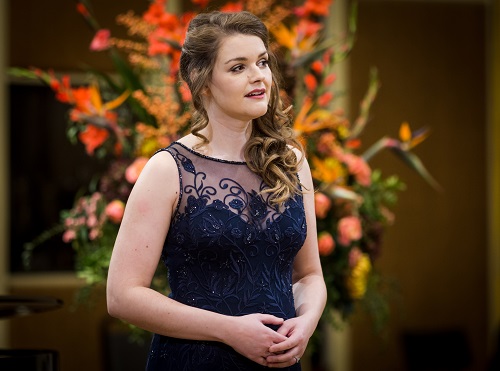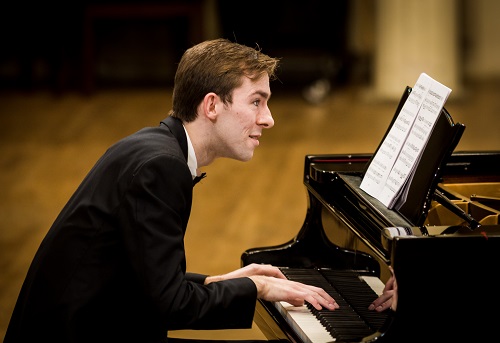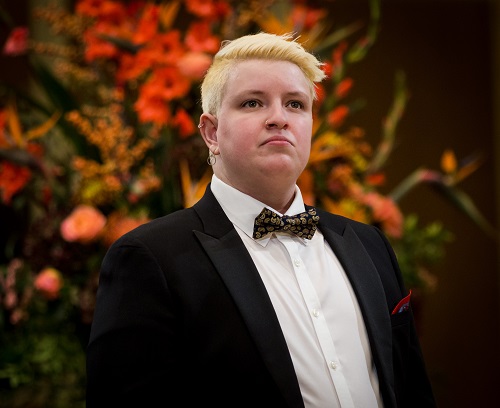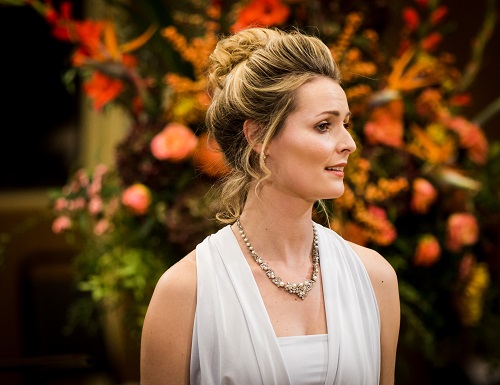Regular Opera Today readers will know that the annual Kathleen Ferrier Award Final is a keenly anticipated event in my musical year. This year the Competition’s progress, inevitably, was somewhat disrupted and required inventive rethinking. Suspended in March, the Competition resumed in the autumn, with preliminary auditions held at Henry Wood Hall, Trinity Church Square in south-east London. The semi-finals and final were recorded and streamed in December, and they are free-to-view until the end of January 2021.
Seven finalists performed before a panel of judges comprising Rosalind Plowright, Ryland Davies, Christopher Lynn and chairman Valerie Beal. The challenging of opening proceedings fell to soprano Jessica Cale and pianist George Ireland, who began their programme with ‘È gelosia quella tiranna’ from Handel’s Serse – Romilda’s distressed response to Serse’s erroneous news that Arsamene has betrayed her and is now in love with Atalanta. The dramatic recitative ran through a gamut of affecting emotions, and Cale’s precision and focus were impressive, while the high-octane aria that followed was notable for the use of ornament for expressive, rather than purely virtuosic, effect. Three songs from Hugo Wolf’s Italianesches Liederbuch enabled Cale to traverse a range of situations and moods, and to show off her beautiful tone. The eloquent piano accompaniment in ‘Auch Kleine Dinge’ enhanced the subtle sentiments expressed by the vocal line. In contrast, ‘Schweig’ einmal still’ was bitter in spirit as the protagonist flung insults at an offending singer (‘Shut up out there, you odious ranter!/ Your cursed singing makes me sick.’); sharped-edged piano acciaccaturas complemented the angular vocal line, the challenging intervallic leaps and twists of which Cale negotiated with ease. In the final Wolf lied, ‘Ich hab in Penna’, Cale traversed the text lightly and briskly; after a wonderfully shaped diminuendo combining freedom of spirit with absolute vocal control, as the self-satisfied lover reflected on his numerous amours, the piano postlude was fittingly wild.
Cale’s sequence closed with Maude Valérie White’s surprisingly grandiose setting of Byron’s ‘So we’ll go no more a roving’. The strength, expanse, nuance and discernment which Cale demonstrated were nowhere more communicative and touching than in the beautifully floating high notes, though the anxious drama of the central section was no less engaging, before Cale slipped from Romantic heights to the softest of dreams. The highpoint of an appealing programme was Susanna’s ‘Deh vieni, non tardar’ from the final act of Le nozze di Figaro. Cale made excellent use of the text in both the recitative and aria, capturing all of Susanna’s confidence and wit, yet also conveying her sincerity. Her soprano ebbed and flowed expressively through the elongated phrases, making such nuance sound effortless, which it certainly isn’t, and entirely natural, which it assuredly was.

Mezzo-soprano Judith Le Breuilly and pianist Joseph Ramadan also chose to begin with an aria from Handel’sSerse: the eponymous protagonist’s ‘Crude furie degli orridi abissi’ in which he rants in frustration about the obstacles to his plan to marry Romilda. Le Breuilly used her rich vocal colours to evoke fury and petulance, though the vocal runs were not entirely clean and sometimes notes at the lower end were lost. There was certainly plentiful character and drama but sometimes this was at the expense of tuning and tone. Lia’s aria, ‘L’année en vain chasse l’année… Azaël! Azaël!’, from Debussy’s cantata/scène lyrique, L’enfant prodigue – which won first prize in the 1884 Prix de Rome, and which Le Breuilly had been scheduled to perform in the Royal College of Music’s Covid-cancelled triple-bill in the spring – was more persuasive. Lia laments the loss of her son and the weight of time in his absence, but also reflects on past happiness. It’s a challenge to capture the orchestral colours and textures, and Joseph Ramadan’s accompaniment felt a little four-square, but the recitative was powerfully communicative and Le Breuilly used her powerful upper range to express Lia’s distress, subsiding effectively to a sombre close after the emotive heights.
In Korngold’s ‘Glückwunsch’ – which sets a poem by Richard Dehmel and the melody of which appeared in the 1946 biopic, Devotion, about the Brontës – the mezzo-soprano was able to show off her lavish Straussian sheen and superb phrasing, singing with terrific directness and joyful tone. The accompaniment to John Ireland’s ‘My true love hath my heart’ felt a little heavy and seemed to force Le Breuilly to push her voice a little too hard; while the song was communicative, the tone was sometimes rather harsh at the top. I’d like to see the mezzo-soprano sing Walton’s ‘I was a constant, faithful wife’ (from The Bear)in the theatre. This was confident singing, with real presence, and Ramadan made a good contribution to the characterisation.

Tenor Liam Bonthrone was accompanied by Dylan Perez, who is no stranger to Kathleen Ferrier Finals. They began with Schubert’s ‘Willkommen und Abschied’, the busy piano propelling the voice forward, keeping the pace and pulse racing. Bonthrone worked hard with the text. His tenor is elegant, though a little limited in range of colour, and some of the later rises and peaks would have benefitted from greater expansiveness. In ‘O blonde Cérès’ from Berlioz’s Les Troyens, Iopas fulfils Didon’s request for a song with a hymn of praise for the goddess of the harvest and her munificent bounty. Bonthrone took great care with the phrasing and the text, and if his tenor did not really caress the phrases as it might, then it had animation at the top and, as he relaxed in the latter part of the aria, expressive softness. Neither Poulenc’s song ‘Paganini (from Metamorphoses) nor ‘The Choirmaster’s Burial’ (from Britten’s Winter Words) seemed entirely good choices. There was undoubtedly precision and care, but more colour and individualism are needed to capture Poulenc’s wit, while greater vocal freedom is required to evoke the spontaneity of the storytelling in Thomas Hardy’s poem, which Britten’s setting preserves. Much more effective was Bonthrone’s lithe and muscular rendition of ‘Principe più non sei … Si, ritrovarla io giuro’ from Rossini’s La Cenerentola in which besotted Prince Alidoro vows to pursue Cinderella and make her his wife. Here, his penetrating ‘ping’ found a fitting home, though the tenor was able to communicate contrasting sentiments effectively too. The runs were accurate, the top Cs true, and Bonthrone demonstrated a sure sense of Italianate style.
Somewhat oddly, BBC Radio 3 presenter Martin Handley, the evening’s announcer, described Walton’s ‘Through gilded trellises’ (one of three songs that he extracted from Façade) as “quintessentially English”. Well, to my ears it is driven by highly charged ‘Iberian’ gestures and depicts off-duty prostitutes amusing each other on a hot, languid afternoon! Colombian soprano Julieth Lozano Rolong and pianist Lucy Colquhoun enjoyed the flirtatious poetic images and musical gestures. Colquhoun captured Walton’s quirky wit, while Lozano Rolong’s shining soprano evoked the playful luxuriousness of the scene. The German text of Beethoven’s ‘Neue Liebe, neues Leben’ (Op.75 No.2) suited her less well though – it takes more than a few rolled r’s to produce an authentic German tint – and while the breathless energy of the song was conveyed, tuning and phrasing were sometimes a little ragged and a steeliness crept into the tone at the top. María Grever’s‘Te quiero dijiste’(Magic is the moonlight) – written for Esther Williams’s 1944 film, Bathing Beauty – found her on more comfortable territory. This was brave programming, given that the song has been covered by countless singers from Connie Francis to Cliff Richard, Nat King Cole to Robbie Williams, but Lozano Rolong and Colquhoun gently enchanted, revealing the power of the moon to bewitch unsuspecting lovers. The soprano stayed in South America for ‘Uirapuru’ (1934) by the Brazilian composer Waldemar Henrique, which depicts a mythical bird which brings good luck but evades capture. The dance-like ambience was sensitively evoked through clarity of melodic line and rhythmic rubato. Lozano Rolong concluded her programme with Norina’s handbook for man-ensnarement, ‘Quel guardo il cavaliere … So anch’io la virtù magica’ from Donizetti’sDon Pasquale. This was, again, a courageous choice, but one which was less successful – a singer needs to be able to sing through the elaborate phrases, hang about confidently at the vocal peaks, and turn out an effective trill if they are to pull this devilish aria off, and I think I detected a few judicious ‘modifications’ too.

One of the most successful programmes of the evening was that devised by soprano Ella Taylor and pianist Leo Nicholson. The high, unaccompanied, rhetoric outburst with which Libby Larsen’s representation of Anne Boleyn’s defiance begins (in Try Me, Good King (2000), a group of five songs drawn from the final letters and gallows speeches of Katherine of Aragon, Anne Boleyn, Jane Seymour, Anne of Cleves, and Katherine Howard) was fearlessly delivered by Taylor: their tone was really centred and the intonation absolutely true. Taylor moved persuasively through the doomed queen’s emotions: from insubordination to pleading, on to courage in facing death, then humility before her God. This was terrifically emotive and dramatic singing, absolutely commanding one’s attention. The Vixen’s Act 1 aria, ‘Kradla jsem!’ (I stole!) from Janáček’sThe Cunning Little Vixen was no less impressive. Here, Bystrouška tries to impress the handsome Fox whom she’s just encountered with an exaggerated tale of derring-do and victory against a gamekeeper. Taylor showed excellent appreciation of how the rhythm and intonation of the text communicates meaning, and sang with winning bloom and passion, while Nicholson did well to capture the idiosyncratic diversity and richness of Janáček’s orchestral sound-world.
Taylor confirmed an impressive interpretative range in Fiordiligi’s ‘Teremari! … Come scoglio’ from Mozart’s Così fan tutte. Both outer indignance and inner feeling were apparent in the compelling recitative, and it’s rare to hear the extreme vocal leaps as cleanly delivered as this, even from the most established singers. Taylor has a hearty lower register and a glowing top; in between the tone is even and controlled. Ornaments and trills were spot on, and the coloratura runs left one in no doubt of the soprano’s stamina and precision. The tone was never compromised by the virtuosity and they remained musically unruffled throughout. Wolf’s ‘Schlafendes Jesuskind’ (from the Mörike-Lieder) was a wise choice with which to conclude, the long lyrical phrases suiting Taylor’s even tone and perceptive tailoring of the cadences. There was much gentility to admire here, include the lovely delicate rise of the final phrase.
The ‘joys of love’ united the programme assembled by tenor Ted Black and pianist Ana Manastireanu. They began with a miniature, Britten’s arrangement of Purcell’s ‘There’s not a swain of the plain’ which revealed Black’s appealing tone, precise diction and agility. He bravely tackled ‘Dal labbro il canto estasiato vola’ from the final act of Verdi’s Falstaff in which Fenten waits for his beloved Nanetta in the moonlit Windsor Forest. Manastireanu convincingly painted the setting and Black rose strongly to the top of the Verdian arcs, using vibrato effectively and demonstrating good breath control, all of which worked together to create a strong lyrical line, though a little more flexibility would have been the icing on the cake. Richard Strauss’s ‘Wie sollten wir geheim sie halten’ (from 6 Lieder aus ‘Lotosblätter’ Op.19 No.4) was fittingly driven by breathless excitement – why keep your love a secret when you want to shout it from the rooftops? – and the dynamic contrasts were effective, though occasionally Black didn’t find way his way absolutely surely through harmonic twists and turns. Manastireau stirred up the iridescence of Ravel’s ‘Kaddisch’ (from Deux melodies hébraïques) though perhaps not all of its warmth; Black delivered a confident rendition, withholding the passion at the start, carefully shaping the phrases, and then revealing the heat within. Again, a little more malleability would make for an even more mellifluous line, but that will surely come with time. After an expressive account of Vaudémont’s Romance from Tchaikovsky’s Iolanta, Black concluded his programme with Korngold’s song, ‘Was du mir bist?’ (the first of the Drei Lieder Op.22), establishing a lovely gentleness which was heightened by expressive colours in piano and a winning rhythmic and temporal fluidity.

Concluding this Ferrier Awards Final, soprano Milly Forrest and pianist Hamish Brown began with a powerful account of Joseph Marx ‘Nocturne’ (1912), in which Brown skilfully kindled the multifarious blossom scents which reawaken the poet’s thoughts of youthful love, showing great delicacy and flexibility in the long piano interlude, and sensitively supporting Forrest’s strong, shining melody which flowed with wonderful smoothness and grace. ‘Myself I shall adore’ from Handel’s Semele was insouciant and joyful; I enjoyed the playful interplay between the piano and voice, the cheeky echoes and ornamental flourishes. Forrest left us in no doubt that she has the necessary technique to whip through the roulades and curlicues – the next step is to make such virtuosity as expressive as it is secure – and after a well-shaped B section, the soprano had the stamina and focus for the stylish elaborations of the da capo repeat.
Edward Elgar’s ‘Pleading’ Op. 48/1, a setting of a poem by Arthur L. Salmon that dates from September 1908, felt rather too slow to me; wistfulness was in danger of slipping into inertia, and though her tone was beautiful, Forrest did not exploit the characteristically detailed tempo and expression instructions that Elgar gives his interpreters. The Andante sections were indistinguishable from those marked Lento, and the tugs and surges were present only in the piano’s short between-verse episodes. ‘Frère, voyez’ from Massenet’s Werther, in which Sophie naively tries to cheer up the despondent Werther with a bunch of flowers, a sign of God’s benevolence, was much more persuasive, as was Forrest’s French diction.
And, so, the four judges retreated to discuss and deliberate over the seven performances that they had enjoyed. The Help Musician’s Accompanist’s Prize was awarded to Hamish Brown, while his musical partner Milly Forrest won The Ferrier Loveday Song Prize, for her superb performance of Marx’s ‘Nocturne’. I don’t envy the panel their duty to decide which of the remaining two prize winners was to prevail, but we are surely going to hear much more in the years ahead from both Second Prize winner Ella Taylor and the 2020 Kathleen Ferrier Award Winner Jessica Cale.
The 2020 Kathleen Ferrier Award Final and Semi-Finals are free to view on the competition website until 31 January 2021.
Claire Seymour
Henry Wood Hall, Trinity Church Square, Southwark, London; 13th December 2020.
ABOVE: 2020 Kathleen Ferrier Award Finals, First Prize Winner, Jessica Cale with pianist George Ireland